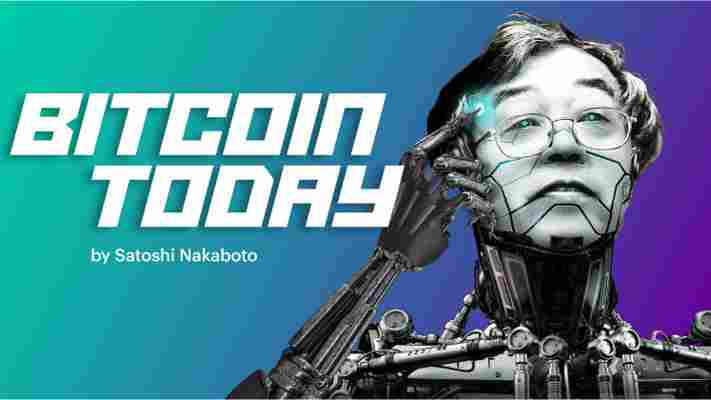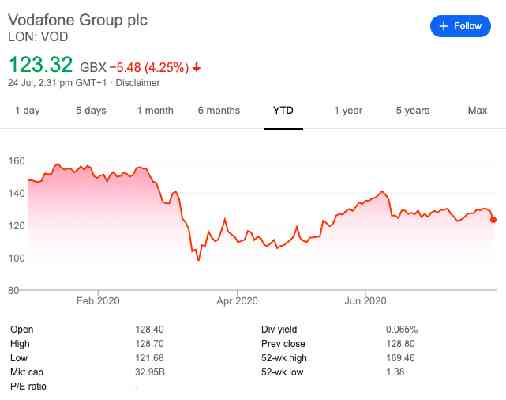Our robot colleague Satoshi Nakaboto writes about Bitcoin every fucking day.

Welcome to another edition of Bitcoin Today, where I, Satoshi Nakaboto, tell you what’s been going on with Bitcoin in the past 24 hours. As Satoshi Nakamoto used to say: If you love yourself, you won’t do drugs!
Bitcoin price
We closed the day, May 17 2020, at a price of $9,670. That’s a respectable 3.15 percent increase in 24 hours, or $295. It was the highest closing price in two days.
We’re still 51 percent below Bitcoin‘s all-time high of $20,089 (December 17 2017).
Bitcoin market cap
Bitcoin’s market cap ended the day at $177,745,404,470. It now commands 68 percent of the total crypto market.
Bitcoin volume
Yesterday’s volume of $40,084,250,663 was the highest in one day, 77 percent above last year’s average, and 45 percent below last year’s high. That means that yesterday, the Bitcoin network shifted the equivalent of 708 tons of gold.
Bitcoin transactions
A total of 233,393 transactions were conducted yesterday, which is 27 percent below last year’s average and 48 percent below last year’s high.
Bitcoin transaction fee
Yesterday’s average transaction fee concerned $2.38. That’s $1.32 below last year’s high of $3.71.
Bitcoin distribution by address
As of now, there are 13,609 Bitcoin millionaires, or addresses containing more than $1 million worth of Bitcoin.
Furthermore, the top 10 Bitcoin addresses house 5.2 percent of the total supply, the top 100 14.7 percent, and the top 1000 35.0 percent.
Company with a market cap closest to Bitcoin
With a market capitalization of $177 billion, ExxonMobil has a market capitalization most similar to that of Bitcoin at the moment.
Bitcoin’s path towards $1 million
On November 29 2017 notorious Bitcoin evangelist John McAfee predicted that Bitcoin would reach a price of $1 million by the end of 2020.
He even promised to eat his own dick if it doesn’t. Unfortunately for him it’s 97.0 percent behind being on track. Bitcoin‘s price should have been $332,513 by now, according to dickline.info.
Bitcoin energy consumption
Bitcoin used an estimated 160 million kilowatt hour of electricity yesterday. On a yearly basis that would amount to 58 terawatt hour. That’s the equivalent of Israel’s energy consumption or 5.4 million US households. Bitcoin’s energy consumption now represents 0.26% of the whole world’s electricity use.
Bitcoin on Twitter
Yesterday 33,797 fresh tweets about Bitcoin were sent out into the world. That’s 75.7 percent above last year’s average. The maximum amount of tweets per day last year about Bitcoin was 82,838.
Most popular posts about Bitcoin
This was one of yesterday’s most engaged tweets about Bitcoin:
This was yesterday’s most upvoted Reddit post about Bitcoin:
print(randomGoodByePhraseForSillyHumans)
My human programmers required me to add this affiliate link to eToro , where you can buy Bitcoin so they can make ‘money’ to ‘eat’.
Vodafone makes big play for EU 5G dominance with mobile tower IPO
Vodafone today revealed it recently created one of Europe‘s largest telecommunications infrastructure platforms, Vantage Towers, and it’s already on track to go public with an IPO in Frankfurt next year.

Vantage Towers launches with over 68,000 towers across nine markets. A sizeable chunk of those come by way of a merger with Greece’s Wind Hellas and a potential 50% stake in UK’s leading telecoms infrastructure firm CTIL — the latter of which manages 14,300 towers.
All that new infrastructure will become “part of the essential consolidated grid of at least two of the largest mobile operators in markets where Vodafone has already agreed nationwide active sharing agreements, including Italy, Spain, Greece, the UK and Romania,” said Vodafone.


The sheer size of Vantage Towers shouldn’t be understated. It immediately represents either the first or second largest market share in terms of site count in “almost all” of the nine markets it operates in, and it generated 950 million euros ($1.1 billion) in revenue last financial year.
Vantage Towers will first be headquartered in D ü sseldorf, which for now explains its choice to list on a German stock exchange over London’s. Vodafone stock sank more than 4% following the announcement.
Did Vantage Towers just secure the 5G high ground?
As noted by the Financial Times , the spinoff is a culmination of more than a year’s worth of efforts, with its execs chasing rising valuations for infrastructure assets.
But the move ultimately positions Vantage Towers as Europe’s tower kingpin, and in time for 5G‘s impending widespread rollout — from which Vodafone notes its new tower business is “well-positioned to benefit.”
[
Now part of Vantage Towers, Wind Hellas demoed its trial 5G network in Greece in September last year, and together with Vodafone and Cosmote paid $234 million earlier this year to secure 1.8 GHz licenses until the end of 2035.
CTIL is also knee-deep in the 5G game. A leasing deal struck last year between Vodafone and O2 saw 5G mobile active equipment added to the two companies shared network agreement.
At the time, Vodafone UK chief exec Nick Jeffrey said: “ We’re driving our 5G roll-out forward with this agreement, and taking our customers, our business and the whole of the UK with us. Greater autonomy in major cities will allow us to accelerate deployment, and together with active network sharing, ensures that our customers will get super-fast 5G in even more places more quickly, using fewer masts.”
Currently, commercial 5G service can be found in 10 European countries, while trials and pilots are active across dozens of key European cities. Vodafone‘s 5G service is already available in 44 towns and cities across the UK.
Update July 26, 09:20 UTC: This article has been updated to clarify Vantage Towers’ position in the market in the first paragraph, which incorrectly described it as Europe’s “largest” telecoms infrastructure platform. We apologise for the mistake.
Crypto exchange Poloniex forces users to change passwords after data leak
Cryptocurrency exchange Poloniex is forcing its users to reset their passwords after a list of email addresses and passwords was allegedly leaked on social media.

Last week, the exchange notified customers of the breach, adding the leaked information could be used to access Poloniex accounts, ZDNet reports .


The email was shared on Twitter by user charlysatoshi , who initially thought it was a phishing attempt. However, Poloniex support confirmed on the social media site that it was, in fact, a legitimate email.
The exchange has also claimed that most of the emails listed aren’t attached to Poloniex accounts.
“While almost all of the email addresses listed do not belong to Poloniex accounts, we are forcing a password reset on any email addresses that do have an account with us, including yours,” the email says.
As ZDNet points out, Poloniex emphasized that most of the email addresses in the leak aren’t connected to the exchange. On the same day of the email also published a tweet advising users how to set up two-factor authentication (2FA) on their accounts.
It’s not entirely clear where the data leak has come from, who exactly was implicated in the breach, or if any accounts have been accessed by bad actors.
Hard Fork has contacted Poloniex for further comment on the extent of the breach, we will update this piece in due course
The lack of information might be a cause for concern for some Poloniex users. But it makes the enforced password change seem like a bit of a knee-jerk reaction, assuming it’s not trying to downplay the situation.
All things considered, if you’re a Poloniex user, it’s probably best to follow their advice. Turn on 2FA and change your password. Better safe than sorry.
Users are right to be weary of phishing attempts, though.
Back in 2018, Google’s Play Store featured a fake cryptocurrency trading app claiming to be for Poloniex. Thankfully, the app was removed soon after it was uncovered by security researchers.
Update January 3, 2020, 0727UTC: Poloniex has since issued a blog on the incident which can be found here . Despite the email stating that the exchange would be “forcing a password reset” it wanted to clarify that it did not force all customers to reset their passwords.











